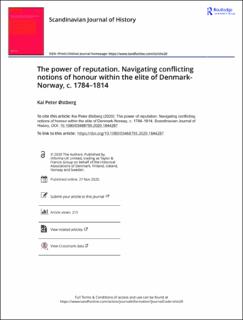The power of reputation. Navigating conflicting notions of honour within the elite of Denmark-Norway, c. 1784–1814
Peer reviewed, Journal article
Published version
Permanent lenke
https://hdl.handle.net/11250/2738921Utgivelsesdato
2020Metadata
Vis full innførselSamlinger
Originalversjon
Østberg, K. P. (2020). The power of reputation. Navigating conflicting notions of honour within the elite of Denmark-Norway, c. 1784–1814. Scandinavian Journal of History, 1-25. https://doi.org/10.1080/03468755.2020.1844287Sammendrag
In the second half of the 18th century, the foundation of monarchical and aristocratic power and prestige was challenged by notions of essential equality and a transformed idea of merit. The elite continued to pursue the traditional marks of distinction, but this behaviour was often accompanied by a discourse stressing the unimportance of such vain and worldly concerns for the truly enlightened person. This article seeks firstly to demonstrate how strong, albeit increasingly ambivalent, sensitivity to such matters was, through analysis of the correspondence of a selection of elite persons. Secondly, it shows the significance of this attitude in its contemporary social and political framework, by analysing legislation concerning rank and honour. This legislation kept alive the hankering after rank, at the very same time that legal and moralizing texts were concerned with the problem of people chasing a ‘false’ honour. These systemic contradictions in the monarchy were reflected in the qualms experienced by its public servants on a personal level. The article argues that the public servants’ doubts about their self-worth probably contributed to eroding their belief in the legitimacy of the regime.

